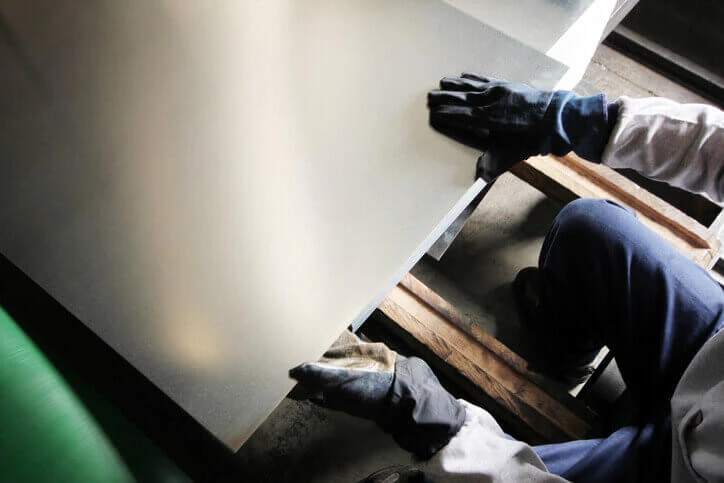Metal fabrication is the process of manipulating and forming metals into desired structures and components by cutting, bending, welding, and assembling. It is of utmost significance since it makes it possible to produce a broad variety of items.
From machinery and equipment to infrastructure and consumer goods, spurring innovation, and development across several sectors.
Metal Fabrication Definition
Metal fabrication is the process of converting unfinished metal components or products into completed goods using a variety of methods, including cutting, bending, welding, and assembly. Metals are shaped and manipulated into desired shapes using specialized equipment and tools.
Numerous industries, including manufacturing, construction, automotive, and aerospace sectors, among others, heavily rely on metal fabrication.
Metal manufacturing has a long history that extends back thousands of years. Ancient societies with advanced metalworking techniques included the Egyptians, Greeks, and Romans. Initially, the main goal of metal manufacturing was to employ bronze and copper to make simple tools and weapons.
The usage of iron and steel revolutionized the creation of metals as metallurgy and industrial processes advanced over time.
With the advent of cutting-edge technology and equipment, metal fabrication has considerably changed in the modern period. Today, a variety of metal production techniques are used to satisfy the requirements of many industries. Here are a few distinctive types:

Industrial Metal Fabrication
For industrial purposes, this kind specializes in producing large-scale metal components and products. The creation of machinery, equipment, and massive structures utilized in the oil and gas, mining, and industrial sectors requires techniques including welding, machining, and metal shaping.
Structural Metal Fabrication
Structural fabrication is the manufacture of structural components utilized in building projects. It involves producing the beams, columns, trusses, and other load-bearing structures that make up the framework of infrastructure like bridges and buildings.
Commercial Metal Fabrication
Commercial fabrication serves the demands of corporations and commercial operations. It entails making metal shelving units, display racks, worktops, and other fixtures for shops, dining establishments, and workplaces.
Architectural Metals Manufacturing
This kind of fabrication focuses on producing attractive and useful metal items for use in architecture. It involves the manufacturing of metal stairs, railings, facades, and ornamental features for use in public areas and in structures.
Custom Metal Fabrication
The process of creating distinctive, custom-made metal items in accordance with the demands of a client is known as custom fabrication. This might include complex creative creations or specialized parts for specialized businesses.
These different types of metal fabrication meet a range of demands in a variety of sectors, which helps to create cutting-edge, useful metal products that enhance infrastructure and technology.

Metal Fabrication Process
Metal fabrication is the process of converting raw metal resources into finished goods or components. The main steps in the manufacture of metal are as follows:
Design
Engineers and designers provide comprehensive blueprints and drawings that include measurements and materials specifications. Accuracy is ensured by cutting-edge software and computer-aided design (CAD) technologies.
Cutting
To split the metal into the necessary shapes and sizes, a variety of techniques including sawing, shearing, laser, plasma, or waterjet cutting are used.
Bending
Metal can be bent or twisted by being distorted in a certain direction with specialized machines called press brakes.
Casting
Complex forms and structures may be made by pouring molten metal into a mold and letting it set up. Sand casting, investment casting, and die casting are common casting processes.
Assembling
Welding, soldering, brazing, or mechanical fastening techniques like screws, rivets, or adhesives are used to link together components.
What Industries Use Metal Fabrication?
Due to its adaptability and capacity to satisfy needs, metal fabrication finds use in a wide range of sectors. Several significant sectors that depend substantially on metal manufacturing include:
- Manufacturing: The production of parts and equipment for industries including automotive, aerospace, electronics, machinery, and appliances is a key function of the metal fabrication industry.
- Construction: Metal fabrication is crucial to the production of architectural features like facades, railings, and stairs as well as structural parts like beams, columns, and frames.
- Utility and Energy Sectors: Transmission towers, pipelines, storage tanks, power plants, and infrastructure for renewable energy all depend on components made of metal.
- Transportation: The production of parts for cars, trucks, trains, ships, and airplanes using metal fabrication ensures their efficiency, durability, and safety.
- Oil and Gas: The production of equipment for drilling, refining, and transporting petroleum, including pipelines, storage tanks, and offshore platforms, depends on metal fabrication.
- Healthcare: The production of surgical tools, hospital furnishings, specialist gear, and other medical equipment, gadgets, and instruments by the metal fabrication industry supports the healthcare sector.
- Architecture and Design: Custom metals, aesthetic features, and structural solutions are frequently provided by architectural projects using metal fabrication.
- Food and Beverage: Metal fabrication is used to build machinery and equipment for food processing, packaging, and storage, guaranteeing cleanliness, effectiveness, and industry conformity.
Metal fabrication is a pillar of many industries, enabling the manufacturing of necessary parts, machinery, and buildings that spur innovation, productivity, and advancement in a variety of fields.
The Future of Metal Fabrication
As technology develops, the field of metal fabrication is set for tremendous breakthroughs. Precision, efficiency, and productivity are rising because of industry-revolutionizing automation, robotics, and artificial intelligence.
Additive manufacturing, sometimes referred to as 3D printing, has enormous promise since it enables complicated designs and minimizes material waste. The potential for metal manufacturing will continue to increase with the development of new materials and alloys with improved qualities.
Additionally, real-time monitoring, proactive maintenance, and process optimization of fabrication will be made possible by the integration of the Internet of Things (IoT) and data analytics. Metal fabrication will continue to push the envelope as technology develops, opening new opportunities for customization, sustainability, and creative uses across sectors.
A Pioneer In The Metal Fabrication Industry
A crucial area that continues to promote innovation and development in many different industries is metal fabrication. The future of this area has tremendous possibilities as technology develops.
Trust Evans Manufacturing for high-quality metal fabrication services. To discuss your project needs and see for yourself the superiority of our craftsmanship, get in touch with us right once.



